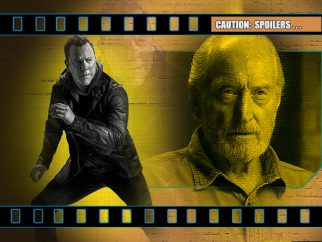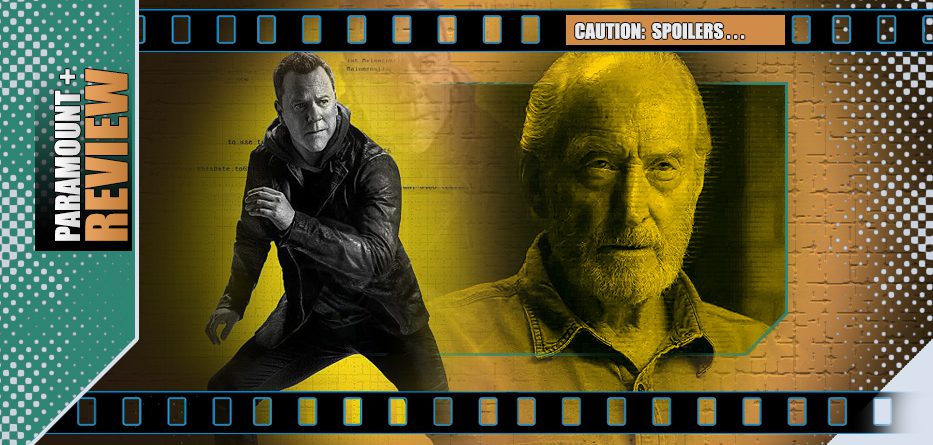As John and his father, Ben, trade ideas and insults – much to the annoyance of ‘hostage’ Hailey – we learn more about John’s earlier life and his eventual reunion with his ‘dead’ father. John also tries to break the code on Valence’s work computer system, but the number of tries he can take is limited and each minute brings his adversaries ever closer to his location…
*spoilers*
It’s interesting that while there’s certainly a lot going on in Rabbit Hole and an awful lot of information to absorb in each episode, it’s so fragmented that it’s hard to do a long review about it – short of listing some of the basic elements and commenting about whether they work. Or is there? Certainly it could all be very, very important. or could it?
The show’s creators Glenn Ficarra and John Requa have said that most of the pertinent questions that viewers will be asking (and there are a lot) are answered as we progress and the third episode certainly explains some things – but there’s so much going on that every Pandora’s Box opens another.
There’s a fair amount of John Weir’s backstory revealed here, or at least the younger years. We know that the young John handled the apparent suicide of his father about as well as you’d expect – distraught, angry, rebelling against his mother and continuing to be obsessed with the secrets he thinks are still locked in his father’s old safe. At the boarding school / establishment he’s finally shipped away to, he makes few friends, but there’s one Miles Valence whom he quickly recognises as sharing an interest in numbers, math and codes. (It’s interesting that what we assumed was a close business relationship with Valence is far more fundamental to Weir’s life, dating back far further than we knew). John enlists him to break out of their dormitory and head back, once again, to his old home where after much gnashing of teeth and multiple tries, they finally manage to open the safe (which for some reason has been left fully intact in the abandoned home). The contents don’t make immediate sense but they will ultimately change their lives and provide the kind of information and techniques on which the boys will ultimately build their tech-empire.
We see the moment in 2013 when Weir Snr. now ‘Ben Wilson’ (Charles Dance) revealed to John that he was still alive – nonchalantly making himself comfortable in John’s apartment, waiting for his return and then offering more of an explanation than an actual apology for the trauma he put his son through. (It’s indicated that John’s mother actually knew of his survival and her breakdown was more a a result of keeping that secret than the fake suicide itself). John is, of course, in initial disbelief and angry at the conspiratorial nonsense that seems to be Ben’s reasoning and its personal cost to him and his late mother…but when Ben makes a prediction about a global event and specific reactions to it being inevitable months ahead of the event… and it then happens, it ultimately brings both John and Valence into the fold as believers.
We also learn that Valence and Weir’s principled business-split was all manufactured and for show – that the disagreement between them on ethics was contrived by the young men (and Weir Snr.) specifically to attract the attention of a figure called ‘Crowley’ the man that Weir Snr./Ben says is busy orchestrating a very long game to ultimately take over the US. Essentially, Ben says that they are playing a similar long-game to their enemy, ever moving pieces into place to play later – sometimes with a shove, other times with the slightest of nudges. Every cog and wheel and human reaction can matter going forward.
Of course, that means that – as a viewer – we’re ever-vigilant as well. Is an ‘incidental’ line of dialogue important, is that person in the background a ‘player’ or are we becoming as obsessed as some of the characters? Though it’s all in the service of a tv drama, it’s fun and slightly disturbing how easily we do see everyday things so casually manipulated and the various examples given in the show for how to subvert power or shift it on a national and international scale could all too easily be applied to events or individuals of recent years. If you haven’t had nightmares about social media monitoring you then you certainly will after watching this show… and maybe with some good reason.
Sutherland continues to navigate that particular Kiefer niche that’s reliably effective and though this isn’t Jack Bauer, it’s likely all 24 fans will be on board. Charles Dance makes an excellent diffident and cold father from whom John inherits a lot of his personality quirks – and with hints that John ended up in a bad way pschologically at least once in his adult life. Meta Golding as Hailey Winton is intriguing – and now we know she’s definitely not a damsel-in-distress but also not apparently in cahoots with the bad guys we know are directly after Weir when she sabotages their attempts to capture them. We also know that whatever secret lies at the heart of this rabbit hole, people seem to be willing to throw themselves off buildings if they fail to fulfil their part in it. First Valence and now bad-guy henchman Xander Arnaz (Jonas Chernick ) plummet to their doom. Well, that is , indeed, a sure sign of complete commitment to a cause.
Rabbit Hole is an enigma wrapped in a puzzle surrounded by a mystery inside a great tv pitch. It’s also tin-foil hokum in the extreme, but it all makes a guilty pleasure with enough contemporary cynicism to make it both fun and a little scary.

- Story8
- Acting8
- Direction8
- Production Design / VFX8












